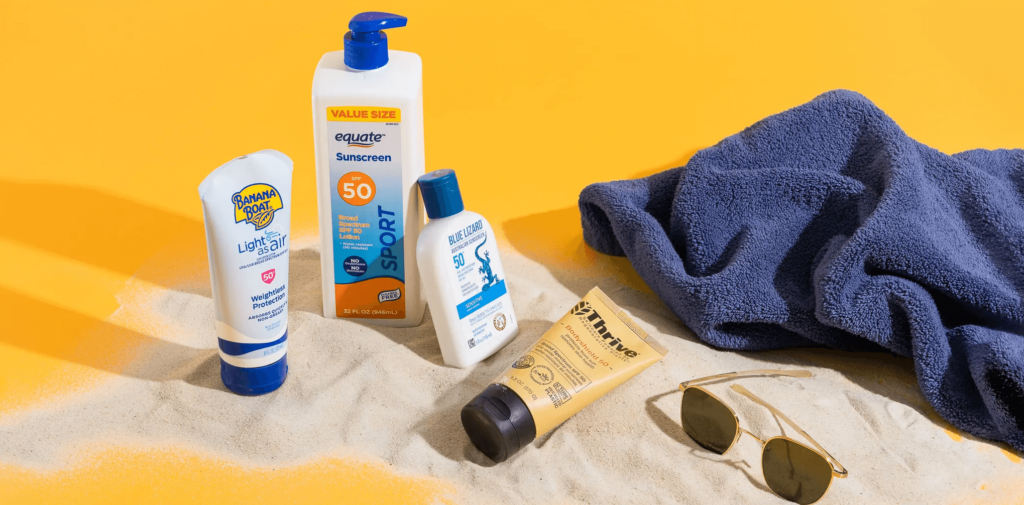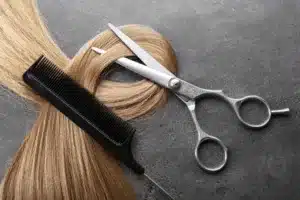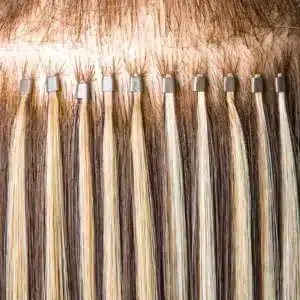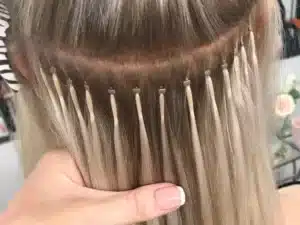Summer brings clients, beach days, and revenue. It also brings stained blondes, lifting tapes, and unhappy callbacks if I do not control sunscreen around installs.
Yes, certain sunscreens can negatively affect hair extensions. Specifically, ingredients like Avobenzone and Octocrylene found in some sunscreens can damage them. Moreover, blonde extensions or those dyed blonde might experience pronounced discoloration, with hues of pink or orange, especially at the tips.

I will show what sunscreen is, how it ruins extensions, how I prevent it in real salons, the exact aftercare I teach, what to do when stains appear, and how to protect your warranty and profit.
What is Sunscreen?
Clients think “SPF is SPF.” It is not. The formula type and the carrier system decide what ends up on the hair and inside the bonds.
Sunscreen protects skin from UVA/UVB using chemical filters that absorb UV or mineral filters that reflect it. The base matters. Oils, esters, silicones, and alcohols move through hair and adhesive systems. These carriers spread fast, resist water, and often sit exactly where I do not want them: on tapes, tips, and weft tracks.
Sunscreen families and why I care
- Chemical filters: Avobenzone, Octocrylene, Oxybenzone, Homosalate, Octisalate, Octinoxate. Most live in oily or silicone-rich carriers. They spread well on skin. They also transfer well to hair and bonds.
- Mineral filters: Zinc Oxide, Titanium Dioxide. These sit in creams and create a physical shield. They transfer less color-reactive residue to hair, though they can leave a white cast if overused.
Why Avobenzone and Octocrylene are my red flags
Avobenzone needs stabilizers; Octocrylene is a common one. Both commonly ride in emollient bases. On porous blonde hair (lifted 613/60/#Platinum), residues cling to the cuticle. In hard water or pool environments, traces of metals (iron/copper) plus UV exposure can shift tone toward peach, salmon, or orange, usually starting at the tips where contact with sunscreened shoulders is constant. On darker shades the shift is muted, but it still warms.

Carriers, not just filters, hurt bonds
Isopropyl myristate, mineral oil, triglycerides, and volatile silicones creep into PU tapes and soften acrylic adhesive tack. Alcohol-heavy sprays dry bonds out, then the formula rehydrates with oils and destabilizes edges. I read labels for both the filters and the vehicle.
Quick reference for front-desk consultations
| Group | Typical INCI | Risk to Bonds | Risk to Blonde Color |
|---|---|---|---|
| Avobenzone/Octocrylene | Butyl Methoxydibenzoylmethane; Octocrylene | High | High |
| Oxybenzone | Benzophenone-3 | Medium–High | Medium–High |
| Mineral filters | Zinc Oxide; Titanium Dioxide | Low | Low |
| Oily carriers | Isopropyl Myristate; Mineral Oil; Triglycerides | High | Medium |
| Alcohol-heavy bases | SD Alcohol; Isopropyl Alcohol | Medium | Low |
How does Sunscreen Ruin Hair Extensions?
When clients wear body SPF high on the shoulders and chest, hair brushes across coated skin. Sprays add overspray to crowns and partings. The result is staining and slippage concentrated at mids and ends, then edge contamination on rows.
Sunscreen ruins extensions through three routes: discoloration on blondes, bond interference on tapes and keratin tips, and residue build-up that creates tangles and matting nodes. Avobenzone and Octocrylene formulas, plus oily carriers, are the main drivers.

Discoloration: why blondes go pink/orange
Blonde, lifted fiber has higher porosity. Residue sticks. Pool metals and hard-water ions interact with certain UV filters and with dyes present in the hair. UV light accelerates oxidation. I see warm halos at ends first, then banding. The pattern maps to SPF contact zones: shoulders, neck, and cheek lines.
Adhesive and bond failure by method
- Tape-ins (PU + acrylic adhesive): Oils and silicones reduce surface energy. Tapes lift at edges, collect lint, and lose peel strength. Clients report “greasy roots” that never feel clean.
- Keratin tips (U/V/Flat): Oily residues migrate over time. Edges soften in heat and friction. Clients start rolling bonds unconsciously, which deforms tips.
- Beaded (I/Nano): Oils lower friction inside the bead. Strands slip or rotate, forming mini-mats below the attachment.
- Sewn/beaded wefts: Oils wick along tracks and at mustache folds. Hand-tied bases loosen faster if repeatedly saturated.
Risk by install (field guide)
| Method | Stain Risk on Blonde | Slippage Risk | Notes |
|---|---|---|---|
| Tape-in | Very High | High | Keep SPF off neck/shoulders until dry |
| Keratin tips | High | Medium | Avoid SPF on hairline; periodic bond checks |
| Beaded | Medium | Medium | Retighten sooner after beach trips |
| Sewn wefts | Medium | Low–Medium | Watch wicking along track |
| Clip-ins | High (but removable) | N/A | Remove before SPF, wash after wear |
How to Avoid Sunscreen Damage
I never tell clients to skip SPF. I change what they use, where they use it, and when hair comes down. This is a choreography, not a lecture.
Avoid damage by switching to mineral sunscreens near hair, applying SPF to body before letting hair down, waiting full dry-down, and keeping hair physically out of the way during sprays. I also add a hair UV product that is non-oily.
Product strategy that works in real life
- Near hair/neck/face: Mineral SPF sticks or creams (Zinc/Titanium). Low oil, fast dry.
- Torso/legs: If a client insists on chemical SPF, I allow it below the collarbone only, with a 15–20 minute dry window.
- No aerosols around hair. If needed, cover hair with a towel first.
Application choreography I teach in-chair
1) Tie hair up high or braid.
2) Apply SPF from waist up, stop at collarbone.
3) Wash hands or wipe palms.
4) Mist mids/ends with a light, silicone-balanced UV leave-in (not an oil).
5) Put on a brim hat or UV scarf.
6) If spraying the body, cover hair and rows completely.
Pool and beach protocol
- Pre-wet hair with clean water. Apply a small amount of conditioner to mids/ends only.
- Rinse with fresh water immediately after swim. Shampoo that evening with a gentle cleanser.
- Use a chelating or hard-water shampoo 1–2× weekly during travel.
- Schedule move-ups on time. Salt, sun, and SPF shorten intervals.
Do/Don’t table
| Do | Why | Don’t | Why |
|---|---|---|---|
| Choose mineral SPF near hair | Lower stain and slip | Spray SPF over parting | Overspray coats bonds |
| Tie hair up for SPF | Limits transfer | Apply body oils on tapes | Causes lift |
| Rinse after swim | Removes salts/metals | Sleep on damp hair | Matting + bond stress |
| Use hats/UV scarves | Physical barrier | Touch bonds with SPF palms | Edge contamination |

Daily Care Notes
Daily habits decide outcomes. I write them on a card and hand it over at checkout. I also bundle the right products so the client does not guess.
Daily care focuses on clean roots, hydrated lengths, and zero residue on attachments. I keep styling simple, non-greasy, and bond-safe. Small changes cut callbacks in half.
Wash and condition plan
- Wash 2–3× weekly with sulfate-free shampoo. Add chelating shampoo weekly in hard-water or high-SPF seasons.
- Condition mid-to-ends only. Keep masks and oils away from tapes, beads, and keratin tips.
- After wash, blow-dry roots fully. Damp bonds attract dust and oils.
Brushing and styling
- Use a loop or soft-bristle brush. Hold roots. Brush ends-to-roots 2–3× daily.
- Use heat protectant. Keep hot tools away from bonds.
- Avoid aerosol texture sprays at the scalp and rows.
Sleep routine
- Never sleep wet. Braid or low pony with a silk scrunchie.
- Use a silk pillowcase to reduce friction.
Weekly checklist (salon printable)
| Task | Tape-in | Keratin | Beaded | Weft |
|---|---|---|---|---|
| Clarify/Chelate | 1× | 1× | 1× | 1× |
| Inspect attachments | Edge seal | Tip integrity | Bead rotation | Track tension |
| Trim/polish ends | As needed | As needed | As needed | As needed |
Which Sunscreen Ingredients Are Safer for Extensions?
I stock and sell the safe options. I also teach clients how to read labels. This prevents arguments later.
Safer choices use Zinc Oxide/Titanium Dioxide and low-oil vehicles. I am cautious with homosalate/octisalate and I avoid Avobenzone/Octocrylene near hair. Format matters as much as chemistry.
Ingredient map for quick decisions
| Tier | Prefer near hair | Use with caution | Avoid near hair/bonds |
|---|---|---|---|
| UV filters | Zinc Oxide, Titanium Dioxide | Homosalate, Octisalate | Avobenzone, Octocrylene, Oxybenzone |
| Carriers | Water, Propanediol | Cyclopentasiloxane | Isopropyl Myristate, Mineral Oil |
| Formats | Creams, sticks, mineral powders | Gel-creams | Aerosol body sprays, dry oils |
Format strategy
- Sticks give precise application on face and part lines without drift.
- Lotions/creams dry down better than oils.
- Aerosols coat everything; I ban them near installs.
Complementary hair UV products
- Choose light, non-oily UV leave-ins. Silicone-balanced sprays give slip without pooling on bonds. Avoid heavy serums on tape rows.
What Should You Do If Discoloration Happens?
I act fast and follow a fixed order. Most cases improve without color if I remove residues correctly first.
When pink/orange appears, I stop oil contact, chelate, and assess porosity before toning. Vitamin C protocols lift mild stains. If tape edges are contaminated, I retape. I never rush to permanent color.
At-home steps (client card)
1) Shampoo with a chelating/swimmer’s shampoo.
2) Mix vitamin C powder with gentle shampoo; apply to stained zones 5–10 minutes; rinse well.
3) Repeat once. Rehydrate ends with a light mask (keep off bonds).
4) Book a salon check if stains persist.
In-salon corrective flow
- Consult + strand test on a hidden weft or tip.
- EDTA/chelating service to remove metals and SPF residues.
- Protein–moisture balance mask to stabilize fiber.
- Tone only if warmth remains, with deposit-only, low-alkaline formulas. Keep chemicals off attachment points.
- Retape/retip contaminated edges. Replace any compromised pieces.
Decision guide
| Severity | Signs | Action |
|---|---|---|
| Mild | Slight warmth at tips | Chelate + vitamin C; no color |
| Moderate | Orange bands mid-length | Chelate → tone; reset SPF routine |
| Severe | Patchy salmon + slippage | Replace pieces; full retape; strict SPF plan |
Salon Policy, Client Education & Warranty
I protect my brand with policy and education. I set expectations before vacations, not after stains. I tie warranty to compliance.
I issue a summer addendum, sell approved SPF, and give a beach card at install. I define what is a defect and what is misuse. This reduces friction and preserves profit.
%[salon policy toolkit(https://placehold.co/600×400 “Salon sunscreen policy for extensions”)]
Dive deeper
Policy framework that works
- Pre-install briefing: Show the ingredient table. Demonstrate the tie-up choreography.
- Approved retail: Bundle mineral SPF + chelating shampoo + UV leave-in.
- Aftercare card: QR to a 60-second video on application and rinsing.
- Checkpoints: Schedule mid-season inspections for frequent swimmers.
Warranty language (sample)
- Discoloration from Avobenzone/Octocrylene or aerosol overspray is not a manufacturing defect.
- Oil-contaminated tapes require paid retape.
- Warranty applies when move-ups are on time and approved products are used.
Team training and tracking
- Run a 30-minute pre-summer huddle.
- Practice “cover-and-spray” demos with towels.
- Track callbacks by product used. Update the toolkit monthly.
My opinion
I see the same pattern in every coastal market. The enemy is not the sun. The enemy is uncontrolled Avobenzone/Octocrylene plus oily carriers living on bonds and blondes. When I switch clients to mineral SPF near hair, teach the simple application choreography, and plan chelating care on travel weeks, the orange stops and the tapes stay sealed. This protects client trust and keeps reapplication revenue predictable.
FAQ
Does every sunscreen ruin extensions?
No. Mineral sunscreens near hair are far safer. The biggest risks come from Avobenzone and Octocrylene formulas carried in oils or aerosols.
Why do blondes turn pink or orange?
Porous blonde absorbs residues. With UV and trace metals, Avobenzone/Octocrylene residues shift tone, most visible at the tips that touch sunscreened skin.
Are sprays worse than lotions?
Yes. Aerosols drift onto the scalp and rows. Lotions and sticks allow targeted placement and lower bond contamination.
Will mineral sunscreen stain my extensions?
Mineral filters rarely stain. They can leave a temporary cast if overapplied. Wipe excess, allow full dry-down, and keep off rows.
Can I protect tape-ins at the beach?
Yes. Tie hair up, use mineral SPF on neck/face, pre-wet hair, braid, rinse after swim, and use chelating shampoo weekly while traveling.
How do I fix color shift fast at home?
Use chelating shampoo, then a vitamin C mask for 5–10 minutes. Rinse well. Hydrate ends. Book a salon check if warmth remains.
Do keratin tips melt from sunscreen?
They do not melt from SPF alone, but oily formulas can soften edges over time, especially with heat and friction.
Do beads slip because of SPF?
Oils reduce friction inside beads, causing rotation or micro-slippage. Plan earlier retightening after beach trips.
Can I use self-tanner with extensions?
Yes, but keep hair away until the product dries fully. DHA and bronzers also transfer and can warm blondes.
What retail bundle should my salon sell?
Mineral SPF stick/cream, chelating shampoo, light UV leave-in, microfiber towel, silk scrunchie, and a small vitamin C sachet.
How often should clients chelate?
Weekly in hard-water or heavy-SPF seasons. Bi-weekly otherwise. Always rehydrate mids and ends.
Is full cuticle hair more resistant to staining?
Yes. It is stronger and smoother, but even full cuticle blonde can stain if repeatedly coated with Avobenzone/Octocrylene residues.
Can I tone stained pieces immediately?
Chelate first. Many stains lift without color. Tone only if warmth remains, and keep chemicals off attachment points.
Conclusion
Sunscreen can ruin extensions, especially blondes, when Avobenzone/Octocrylene and oily carriers reach hair and bonds. Choose mineral SPF, control application, rinse fast, and enforce clear salon policies.




